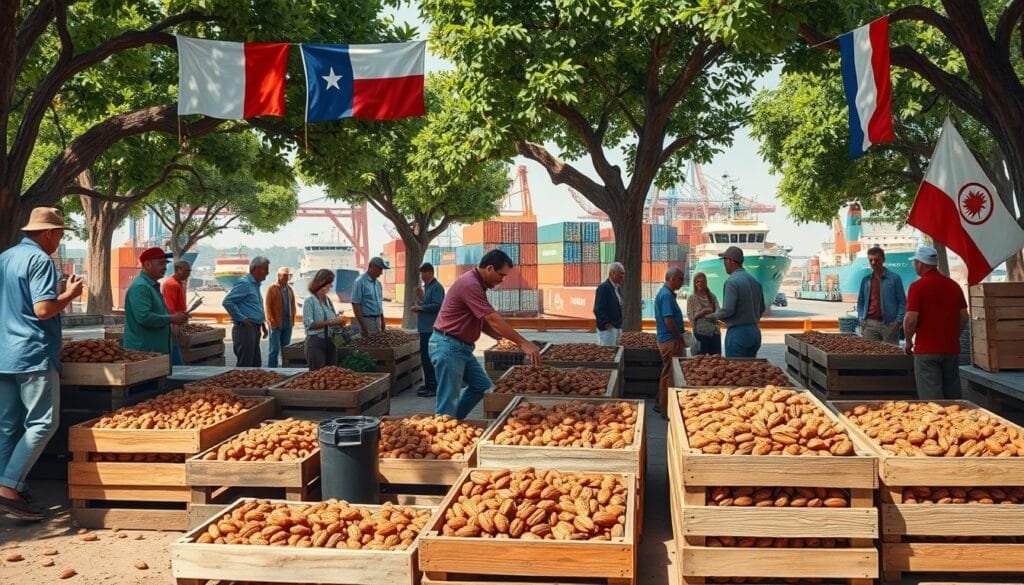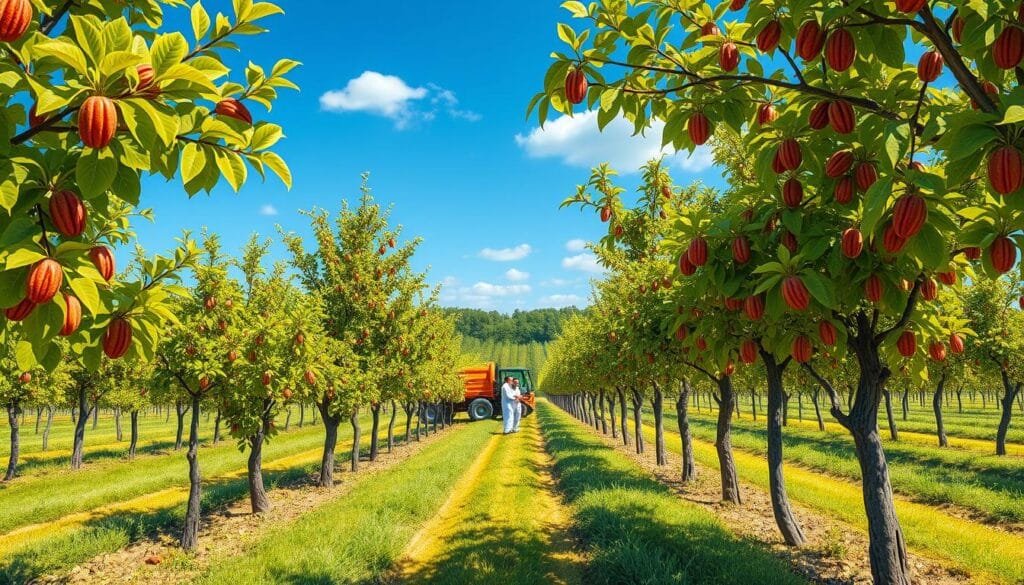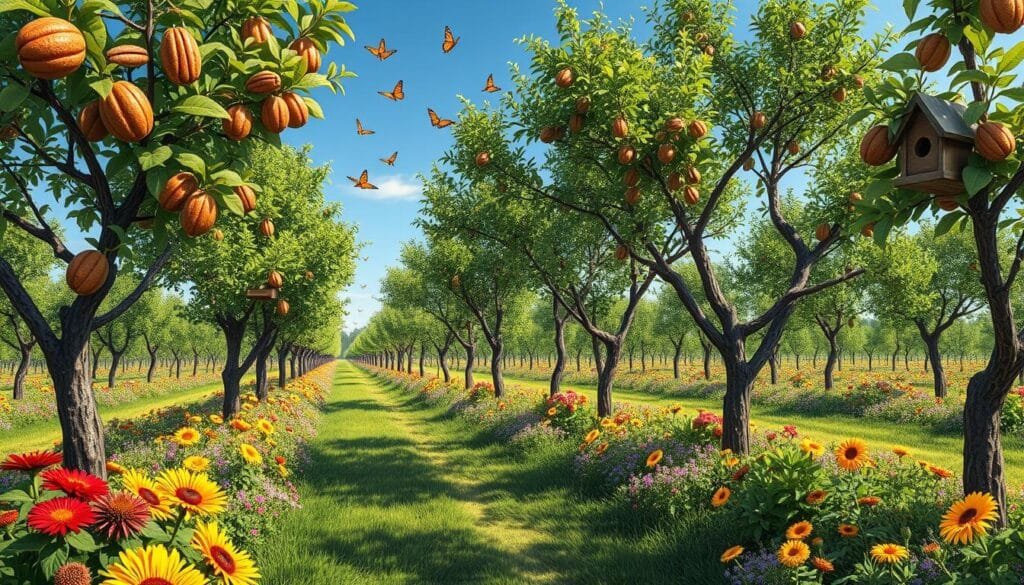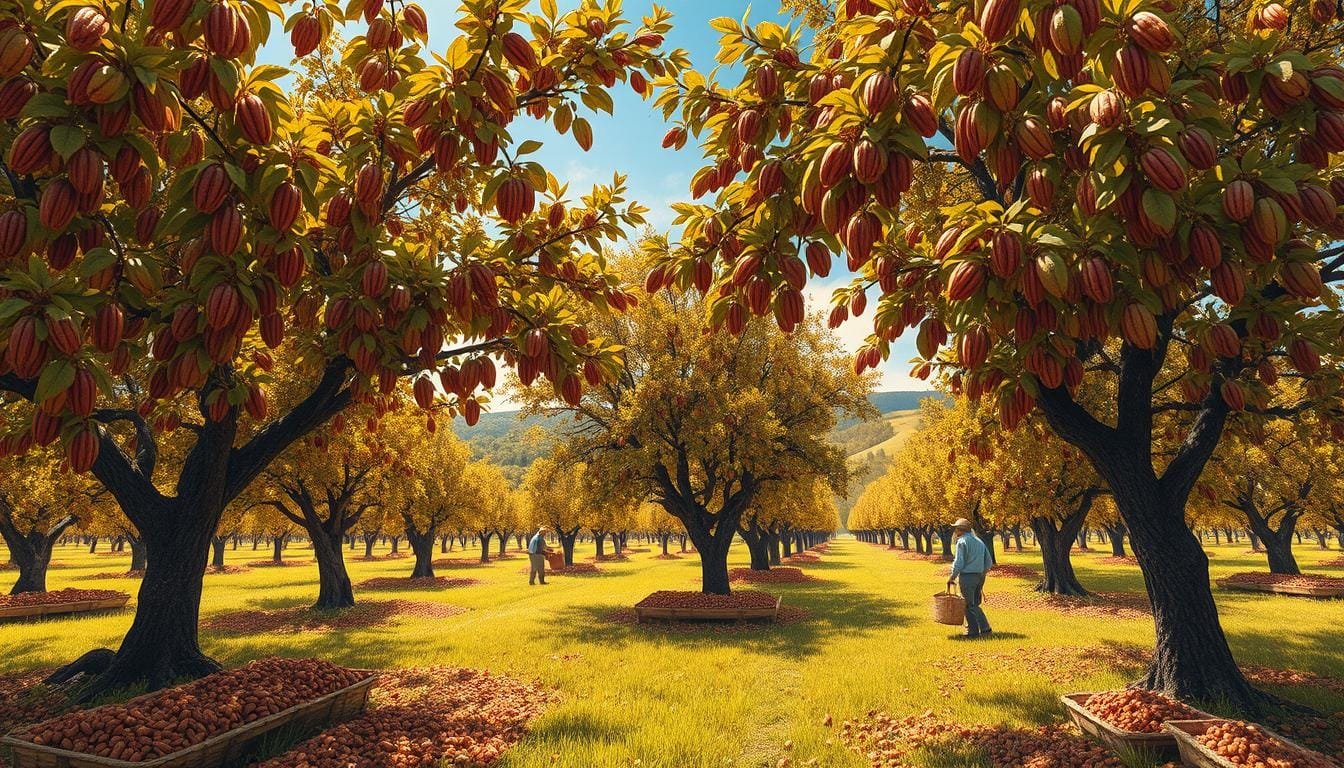The growth of the pecan industry is key to improving local economies. We’ll look at how this nut crop’s success affects everything from small farmers to worldwide markets. Pecans have moved from a treasured native food to a vital part of farming. They are a source of nutrition and economic growth, deeply rooted in North American history.
Pecans’ journey from native lands to places like Oklahoma shows their impact on economies. The U.S., where pecans come from, has seen this nut blend sustainability with business. As people see pecan’s health benefits, demand rises. This boosts the industry and strengthens agriculture.
Key Takeaways
- The pecan industry, native to North America, elevates the U.S. nut crop sector with a 2021 production value estimated at $551 million.
- Increased pecan consumption accentuates the nut’s role in enhancing local economies, particularly in leading producer states like Georgia, New Mexico, and Texas.
- Strategic marketing efforts, such as the Pecan Promotion, Research, and Information Order, are driving industry growth and pecan market expansion.
- Asian export markets are strengthening, reflecting the global demand and projected 6% annual growth of the world pecan market.
- Recognizing the lengthy tree maturation and the substantial investment necessary for orchard development, the long-term economic significance of pecans cannot be overstated.
- Agro-innovation, including alternative management systems and intercropping strategies, is bolstering the industry’s sustainability and profit potential.
- Enterprise budgets and resources like those from OSU provide essential insights for success in pecan farming, framing a future of continued industry growth.
The Vital Role of Pecans in Agriculture
Pecans are a key part of both food culture and farming. Their importance goes beyond their tasty crunch. Exploring their origins, how they help farms, and their use in different crops shows their critical role in agriculture today.
Native Range and Agricultural Expansion
Pecans grow from Mexico to Illinois, especially in river bottoms with other trees. Their wide range helps them play a big role in their habitats. Some places are over half pecan trees. Farmers grow pecans in places that match their natural home. This helps the plants do well and keeps nature balanced.
Comparison to Other Nut Crops
Pecans have benefits that other nuts don’t. They’re easier on the soil and need fewer bug sprays, so they’re better for the planet. Farmers who want to grow different kinds of crops like them because they’re also friendly to the environment.
Sustainability in Pecan Farming
Sustainable pecan farming uses old methods like letting animals graze in the pecan orchards. This smart farming is good for both nature and business. It uses land well and cuts down on chemicals.
| Aspect | Details |
|---|---|
| Percentage of Global Supply | 80%-90% produced by the United States |
| Annual Production Volume | Nearly 300 million pounds |
| Leading State | Georgia with approx. 50% of U.S. production |
| Economic Impact | Ranges from $400 million to $800 million annually in the U.S. |
| Export Value (2022) | $308 million with significant contributions from both inshell and shelled pecans |
Economic Contributions of Pecan Farming
Pecan farming significantly impacts local economies and the global nut market. The pecan market value is growing due to high domestic and international demand. This makes pecan farming a key player in agriculture’s profitable and sustainable future.
Annual Revenue and Market Trends
The pecan industry generates impressive annual revenue. In the U.S., about 75% of the world’s pecans are produced, totaling 275 million pounds. This not only meets domestic needs but also makes the U.S. a major contributor to the strong pecan market value in global markets.
Irrigation and Reduced Pesticide Use in Profit Maximization
New irrigation technology and sustainable pest control are improving pecan farming. Better irrigation helps in dry areas like New Mexico, leading in pecan production. Using fewer pesticides, farmers ensure their pecans are top quality, helping the environment and their profits.
International Trade and Emerging Markets
Pecan international trade significantly boosts the industry’s income. With a growing demand in places like Asia, pecan exports have increased. This opens up new markets, diversifying income and stabilizing the economic role of pecan farming worldwide.

| Year | Production (lbs) | Annual Revenue (USD) |
|---|---|---|
| 2020 | 260 Million | 780 Million |
| 2021 | 270 Million | 810 Million |
| 2022 | 275 Million | 825 Million |
What Is the Economic Importance of Pecans
The pecan’s economic impact is huge, not just locally but worldwide. The United States leads the world in producing pecans. This positions the U.S. at the heart of market trends and how these nuts are consumed globally. Georgia led the charge in 2022, producing 132 million pounds, showcasing its role in agricultural progress.
The rise in pecan consumption goes hand-in-hand with growing health awareness. Pecans are celebrated for their antioxidants and are used in many recipes. This blend of health benefits and flavor increases their value economically.
| Year | Total Production (million pounds) | Value (million USD) |
|---|---|---|
| 1970 | 340 | 60.5 |
| 1991 | Data Not Specified | 309 |
| 2022 | 278 | 500 |
Georgia’s strong bond with pecan farming has made it an agricultural pioneer. It also turned the state into a hub for agriculture-related tourism and business, boosting its economy. Moreover, advances in farming methods have helped U.S. growers overcome challenges and continue producing pecans efficiently.
Additionally, 28% of U.S. pecans are sent overseas, showing the international demand for these nuts. This export success proves pecans are major players in global trade and nutrition. All in all, pecans are not just normal crops. They bring significant economic and cultural value.
Innovations and Advances in Pecan Production
Pecan production is crucial in the eastern United States. It is the most significant commercial nut crop. Recent pecan cultivation advancements and pecan breeding programs have changed the game. They’ve made big strides in how and where we grow pecans. These changes have boosted production and made farming more sustainable.
Breeding programs are key in these advances. They aim to improve pecan varieties. By focusing on disease resistance, nut quality, and environmental adaptability, these programs make pecan farming more sustainable for the future.
- Inclusion of non-chemical weed control methods to reduce environmental impact
- Adoption of legume-based orchard flooring for natural nitrogen fixation
- Application of organic fertilizers as part of an integrated nutrient management system
- Enhanced pest management strategies, including the use of pheromone traps and biological control agents
- Minimized use of ‘soft’ pesticides and the promotion of insect growth regulators that are less harmful to non-target species
Adopting these strategies helps keep the orchard healthy. It also protects the ecosystems around it. This boosts the pecan industry’s sustainability. Using modern technology and precise monitoring, pecan orchards can practice precise agriculture. This approach reduces waste, improves yields, and gives better quality nuts.

| Statistic | Detail |
|---|---|
| Average Yields | 600 lbs./acre with potential over 1,000 lbs. |
| Net Returns | $100 per acre from native pecans sold wholesale |
| Land Costs | Often exceeding $2,000/acre |
| Lease Arrangement Returns | Ranges from 60/40 to 90/10 split in favor of the manager |
| Projected Crop Decline | 11.7% decrease attributed to Hurricane Helene |
In summary, the focus on sustainable production and improvements through pecan breeding programs do more than boost yields. They also protect our environment. Thanks to these major pecan cultivation advancements, the future of pecan farming looks bright.
Pecan Cultivation: From Native Groves to Commercial Orchards
The journey of pecan cultivation has shifted from wild groves to large commercial farms. This change shows how important pecan cultivar development is. It has made pecan farming better and more efficient.

The Evolution of Cultivar Development
In the 1800s, ‘Centennial’ became a big step in pecan breeding in Louisiana. Now, we have over 500 types of pecans, each fit for certain climates and needs. These varieties help the pecan industry meet market needs and face environmental challenges. You can learn more about pecan history and its impact on farming today.
Agroforestry and Eco-Friendly Farming Practices
Using agroforestry practices, like having animals graze among pecan trees, helps the environment. It uses land well and makes the ecosystem stronger by improving soil and controlling pests naturally. Mixing different crops with pecan trees also helps, making farms more diverse and stable.
| Aspect | Requirement | Benefit |
|---|---|---|
| Water Usage | 2 inches per week | Consistent growth and nut quality |
| Nutrition | Granular zinc sulfate or liquid zinc nitrate sprays | Essential for vital growth phases |
| Pest Management | Regular monitoring for pests like Pecan Nut Casebearer and Aphids | Prevents significant crop losses |
| Annual Production in Texas | 60,000,000 pounds | Stable supply to meet national demand |
By combining agroforestry and tough cultivars, pecan farming keeps up with modern agriculture. These methods help produce pecans sustainably. They take care of our environment while supplying nuts worldwide.
Conclusion
The importance of the pecan industry is huge. The mighty pecan tree is a symbol of agricultural heritage that goes back centuries. Its history with humans dates to at least 6,750 BCE. Pecans provided food for many Native Americans. They also started a wide trade network, spreading these nuts from Iowa and Indiana to Alabama, Texas, and Mexico.
The pecan tree is still valuable today, economically. Both edible and non-edible pecans are used in many products, like sweets and beauty products. Pecan wood is sought after for making furniture and tools, showing the tree’s wide economic importance. Pecans also support other crops by being grown in agroforestry systems, improving the health of ecosystems and helping farmers make more money.
But keeping the pecan industry strong requires focus on the environment and how these trees are grown. Pecan trees face threats from fire, pests, and lack of zinc. They need careful management and a frost-free time to produce nuts well. Thanks to new farming methods, we can overcome these challenges. This ensures the pecan tree remains a key part of our economy and environment. Looking at the long history of pecans, we see a tree that has shown incredible adaptability and economic value, ready to continue its legacy into the future.
FAQ
How has the pecan industry contributed to the growth of local economies?
The pecan industry has been a big boost for local economies. It creates jobs, draws tourists, and boosts shopping. Places like Georgia and Oklahoma see a lot of economic benefits from growing and selling pecans.
In what ways does pecan farming promote agricultural sustainability?
Pecan farming is good for the earth. It uses less soil and fewer insecticides. Farming practices, such as grazing livestock with pecans and planting other crops with them, help nature.
What is the annual revenue generated by the pecan farming industry?
The pecan industry makes between 0-800 million a year. America grows up to 90% of the world’s pecans. That’s about 300 million pounds every year.
How has the native range of pecans influenced their agricultural expansion?
Pecans are native from Mexico to Illinois, especially in river bottoms. Their wide native range proves they can grow in many places. It shows their potential as a food source and trade item.
What advancements in pecan production have been made to ensure a sustainable future for the industry?
Many new steps have been taken towards sustainable pecan farming. This includes breeding new types, using no chemicals for weeds, organic fertilization, and modern watering methods. These help the industry stay green and keep going long-term.
Can you explain the significance of pecan cultivar development in commercial orchards?
For 150 years, developing new pecan types has been key. Since the first ‘Centennial’ graft, over 500 cultivars have been developed. They are better at fighting disease, growing more nuts, and improving nut quality. This shows how the industry keeps getting better.
How does pecan farming impact American nut crop significance and consumption patterns?
Pecans, being native to the U.S., are very important in American farming. More people are eating them because they’re healthy. They’re also a big part of our food traditions and now, the world wants them too.
What role does international trade play in the pecan industry’s economy?
International trade is key to the pecan business. It expands the market outside the U.S. Places like China want more pecans, which grows the industry. This has led to big investments in pecan farming and advertising.
How is the agroforestry approach beneficial in pecan cultivation?
Agroforestry, like mixing livestock with pecan trees or growing other crops, is great. It keeps nature diverse, enriches the ground, and brings in more money from nuts and other farm products. It’s good for the planet and profits.
